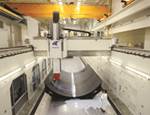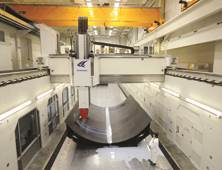Tooling boards improve processes
In the composites industry, many parts are the product of one-off or few-of-a-kind production programs. In response, tooling material suppliers today provide an increasing variety of relatively inexpensive materials grouped under the heading of tooling board.
In the composites industry, many parts are the product of one-off or few-of-a-kind production programs. In response, tooling material suppliers today provide an increasing variety of relatively inexpensive materials grouped under the heading of tooling board. Supplied in a range of standard sizes, shapes and thicknesses, these sheet materials can be cut, adhesively bonded into large 3-D blocks and shaped with conventional hand tools or automated machining equipment, providing a fast, simple means to craft a tool with reasonable surface acuity at an affordable price. New board materials are improved in their machinability, durability, thermal stability and surface quality.
Finnish tooling and production line supplier Meteco (Karstula and Kuhmoinen, Finland) has a long résumé in providing tools, jigs, fixtures, 5-axis machining and complete manufacturing chain design. A specialist in large, out-of-autoclave tooling for composites and complete engineering packages for production, the company recently provided to a major aerospace manufacturer a large infusion mold (more than 10m/32.5 ft in length) that weighed 35 metric tonnes (77,162 lb). New in its composites portfolio is a tooling board product called MetecoRock, made from a mined mineral similar to soapstone. Intended for master models or small series-production/prototype cure tools, this naturally occurring material can withstand very high temperatures (up to 1400°C/2550°F) and has a much lower coefficient of thermal expansion (CTE) than a typical epoxy tooling board. For larger tools, blocks of MetecoRock can be bonded with a high-temperature adhesive, such as bismaleimide. A minimum bondline thickness of 15 mm/0.6 inch is recommended to avoid cracking. Although it is considerably heavier than polymer-based tooling boards, the new board is extremely stable, experiences no expansion due to moisture uptake, has very low porosity and is completely recyclable. Polishing enables a very smooth surface quality, says the company, without the need for filler. The material is currently undergoing customer testing, says the company.
New to General Plastics’ (Tacoma, Wash.) product card is FR-4700, a high-temperature polyurethane-based tooling board that can take a peak temperature of 400°F/204°C and a continuous processing temperature of 350°F/175°C. That’s significantly higher than other polymer-based tooling boards on the market, says the company’s business development director Brian Sweeney. “It opens up a whole new area of application for tooling boards,” he claims, noting that “in the past, most part cure-cycle temperatures were too high for standard tooling boards and dimensional stability would suffer.” The new product comes in three densities (up to 40 lb/ft2) and in sheet sizes up to 48 inches by 96 inches (1.2m by 2.5m), says Sweeney.
Coastal Enterprises (Orange, Calif.) has formulated a new tooling board product, an as-yet-unnamed non-cellular material based on polyurethane chemistry. “In the past, the porosity of tooling boards often has been an issue. They require a coating to achieve a smooth surface,” says Chuck Miller, Coastal’s president. The new product, available in densities ranging from 25 to 60 lb/ft2, can be made in large sizes and can be polished to a very smooth surface without any filling or coating. Tests, so far, are promising, and Miller reports that the boards are compatible with standard epoxy adhesives.
Coastal Enterprises is one of the few suppliers that provide custom-assembled tooling boards, adhesively bonded to a customer’s rough shape, to reduce machining time and waste. Further, the density of the epoxy bonding adhesive is adjusted to match the board density. This results in less stress on the machining system due to sharp transitions in cutting resistance.
Another new tooling board product, introduced by Airtech International Inc. (Huntington Beach, Calif.) at the recent JEC Composites Show in Paris, is TB G48, a high-temperature carbon/epoxy tooling board. With a maximum service temperature of 450°F/232°C, TB G48 delivers stability at high temperature, says the company, for use as mold tool supports, bonding jigs, drill fixtures and postcure supports. Both sides of the tooling board have a peel ply layer in place, which provides surface protection during storage and machining. After the ply is removed, the lightly textured surface can be prepared for bonding, says Airtech’s technical director, Guy Schindler.
Related Content
Testing to support composite bolted joint analysis
An overview of ASTM Standard Guide D8509, and its coupon-level mechanical testing of design properties for analyzing composite bolted joints.
Read MoreASCEND program completion: Transforming the U.K.'s high-rate composites manufacturing capability
GKN Aerospace, McLaren Automotive and U.K. partners chart the final chapter of the 4-year, £39.6 million ASCEND program, which accomplished significant progress in high-rate production, Industry 4.0 and sustainable composites manufacturing.
Read MoreCutting 100 pounds, certification time for the X-59 nose cone
Swift Engineering used HyperX software to remove 100 pounds from 38-foot graphite/epoxy cored nose cone for X-59 supersonic aircraft.
Read MoreOptimized rib-reinforced hollow composites via printed molds
Addyx topology optimization and water-soluble mandrel enables simultaneous rib and skin layup for one-shot, high-strength, lightweight structures.
Read MoreRead Next
Tooling for composites: Evolutionary trajectory
New technologies and improved methods keep up as tools get bigger and more complex and toolmaking gets ever more challenging.
Read MoreCeramic matrix composites: Faster, cheaper, higher temperature
New players proliferate, increasing CMC materials and manufacturing capacity, novel processes and automation to meet demand for higher part volumes and performance.
Read MoreNext-gen fan blades: Hybrid twin RTM, printed sensors, laser shock disassembly
MORPHO project demonstrates blade with 20% faster RTM cure cycle, uses AI-based monitoring for improved maintenance/life cycle management and proves laser shock disassembly for recycling.
Read More












